The US State Department has announced a controversial 12-month pilot program that could require visitors from certain nations to pay a $15,000 visa bond when applying for B-1/B-2 business or tourist visas. The policy, designed to reduce visa overstays and address screening deficiencies, targets countries with high overstay rates or those offering “Citizenship by Investment” programs without residency requirements. While the notice doesn’t specify affected nations, it grants consular officers broad authority to impose the bond at their discretion.
The proposal aligns with President Trump’s second-term executive orders cracking down on illegal immigration, following earlier measures like travel bans on nationals from 12 countries, revoked student visas for those engaged in pro-Palestinian activism, and detentions of international students for minor infractions like speeding tickets.
Critics have meanwhile, argued that the exorbitant bond requirement could deter legitimate travelers while immigration lawyers warn it may unfairly target applicants from developing nations.

How the Visa Bond System Would Work
Under the program, applicants from high-overstay countries could be forced to pay $15,000 per visa, funds would be forfeited if visitors violate terms (e.g., overstaying) and consular officers decide bond applicability case-by-case
The State Department is also insisting that the measure protects national interests, but opponents call it a “wealth test” that could harm tourism and business travel. With no list of affected countries yet published, uncertainty looms for millions of potential visitors.
Why It Matters
This news is following the controversial visa revocations linked to political activism and minor legal violations, sparking accusations of discriminatory enforcement. As the administration gears up to implement the pilot, questions linger about its economic impact and diplomatic consequences, especially for allied nations with higher overstay rates.

















